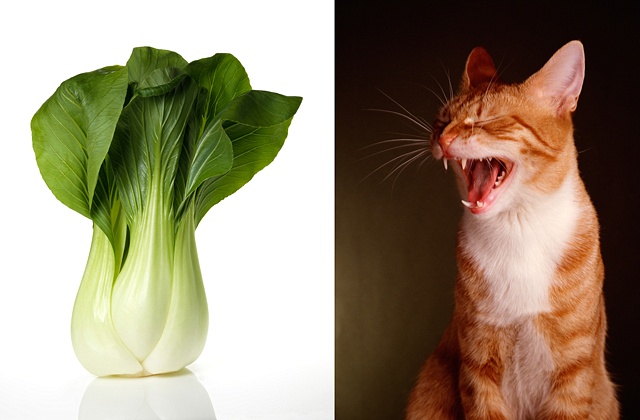Cats are known for their curious nature when it comes to exploring new foods. As a cat owner, you may have wondered if it is safe to share some of your favorite vegetables with your feline friend. One such vegetable that often raises questions is bok choy. In this article, we will delve into the topic of whether cats can eat bok choy and explore its nutritional benefits and potential risks for our beloved pets.

The Nutritional Value of Bok Choy
Bok choy, also known as Chinese cabbage, is a leafy green vegetable that belongs to the cruciferous family. It is packed with essential nutrients that can benefit humans, but what about cats? Let’s take a closer look at the nutritional value of bok choy and its potential impact on our feline friends.
1. Vitamins and Minerals
Bok choy is a rich source of vitamins A, C, and K, as well as minerals like calcium, potassium, and iron. These nutrients play a vital role in maintaining overall health and supporting various bodily functions. While cats have different dietary requirements than humans, some of these vitamins and minerals can still be beneficial for them in moderation.
2. Fiber Content
Fiber is an important component of a cat’s diet as it aids in digestion and helps prevent constipation. Bok choy contains a good amount of dietary fiber, which can contribute to a healthy digestive system in cats. However, it is crucial to introduce fiber gradually and monitor your cat’s response to avoid any digestive issues.
3. Antioxidants
Bok choy is known for its high antioxidant content, which helps combat free radicals and reduce the risk of chronic diseases. Antioxidants play a crucial role in maintaining a strong immune system and promoting overall well-being. While cats produce their own antioxidants, incorporating foods rich in antioxidants, like bok choy, can provide additional support.
Can Cats Safely Consume Bok Choy?
Now that we understand the nutritional value of bok choy, the question remains: can cats safely consume this leafy green vegetable? While bok choy is generally safe for cats, there are a few factors to consider before adding it to their diet.
1. Digestive Sensitivity
Cats have a sensitive digestive system, and introducing new foods abruptly can lead to gastrointestinal upset. It is essential to introduce bok choy gradually and in small quantities to monitor your cat’s response. If you notice any signs of digestive discomfort, such as vomiting or diarrhea, it is best to discontinue feeding bok choy.
2. Preparation and Cooking
When offering bok choy to your cat, it is crucial to prepare it properly. Thoroughly wash the leaves to remove any dirt or pesticides. Additionally, cooking bok choy can make it easier for cats to digest and reduce the risk of choking hazards. Avoid seasoning or adding any spices, as certain ingredients can be harmful to cats.
3. Individual Cat’s Health
Every cat is unique, and their dietary needs may vary based on their age, health condition, and overall well-being. It is always recommended to consult with your veterinarian before introducing any new food into your cat’s diet, including bok choy. They can provide personalized advice and ensure that it aligns with your cat’s specific nutritional requirements.
Potential Risks and Precautions
While bok choy can offer some nutritional benefits to cats, there are potential risks and precautions to be aware of:
1. Oxalates
Bok choy contains oxalates, which can interfere with calcium absorption and potentially lead to the formation of urinary stones in some cats. If your cat has a history of urinary issues or is prone to developing urinary stones, it is best to avoid feeding them bok choy.
2. Allergic Reactions
Just like humans, cats can have allergies or sensitivities to certain foods. If you notice any signs of an allergic reaction, such as itching, swelling, or difficulty breathing, after feeding your cat bok choy, discontinue its consumption immediately and seek veterinary advice.
3. Moderation is Key
While bok choy can be a healthy addition to your cat’s diet, it should only be given in moderation. Treat it as an occasional snack or a small part of a balanced meal. Remember that a cat’s primary diet should consist of high-quality cat food that meets their specific nutritional needs.
Conclusion
In conclusion, cats can safely consume bok choy in moderation, considering certain factors such as their individual health, digestive sensitivity, and preparation methods. Bok choy can provide essential vitamins, minerals, and antioxidants that can support your cat’s overall well-being. However, it is crucial to consult with your veterinarian before introducing any new food into your cat’s diet to ensure it aligns with their specific dietary requirements.
FAQs
-
Can cats eat raw bok choy?
While cats can technically eat raw bok choy, it is generally recommended to cook it before offering it to your cat. Cooking can make it easier for cats to digest and reduce the risk of choking hazards. -
How much bok choy can I give my cat?
Bok choy should only be given in small quantities as an occasional snack or a small part of a balanced meal. Consult with your veterinarian to determine the appropriate portion size for your cat based on their specific needs. -
Are there any other vegetables that cats can safely eat?
Yes, there are several vegetables that cats can safely consume in moderation, such as cooked carrots, peas, and pumpkin. However, it is important to research each vegetable and consult with your veterinarian before introducing them to your cat’s diet. -
Can bok choy replace cat food in my cat’s diet?
No, bok choy should not replace cat food in your cat’s diet. Cat food is specially formulated to meet their specific nutritional needs. Bok choy should only be considered as a supplemental treat or addition to their regular diet. -
What are the signs of an allergic reaction in cats?
Signs of an allergic reaction in cats may include itching, swelling, redness, hives, vomiting, diarrhea, or difficulty breathing. If you suspect your cat is having an allergic reaction, seek veterinary assistance immediately.

